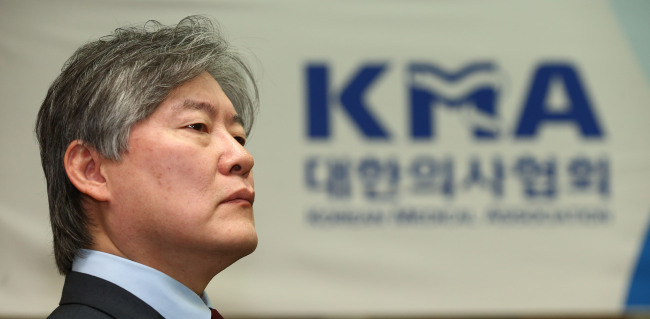South Korean doctors hammered out a compromise with the government on Monday over new medical policies, raising the odds that a second walkout slated for next week might be called off.
The Korean Medical Association, the country’s largest group of medical doctors, and the Health and Welfare Ministry said they had worked out the deal late Sunday, about a week after doctors launched a one-day strike on March 10 in protest of the government’s push to allow telemedicine and for-profit subsidiaries for hospitals.
Both parties agreed to launch a six-month telemedicine pilot program next month to test the efficacy and safety of using communications technology for treating patients in remote areas.
 |
Korean Medical Association head Roh Hwan-kyu listens to an announcement on the deal made between the KMA and the government over new medical policies on Monday. (Yonhap) |
While both sides acknowledged the need for introducing telemedicine in the initial round of negotiations last month, they bickered over whether the pilot program should start before or after the formal telemedicine legislation.
The KMA said the pilot program will be jointly carried out ahead of the legislation.
Based on the latest negotiation results, doctors will cast votes to decide whether to stage the six-day strike from next Monday. The results of the votes will be released on Thursday.
The second strike is expected to have a greater impact than the first one with a higher participation of medical residents. The possibility of the planned walkout, however, remains low, the KMA said.
“For now, the odds that the second strike will be staged remain low as medical residents said they would respect the results of the doctors’ vote, and their major requests have been accepted by the ministry,” KMA president Roh Hwan-kyu said.
The participation of medical residents was considered a driving force for the protest as it increased the impact of the first strike.
The ministry said it would not negotiate with doctors anymore.
“If the KMA rejects the negotiation results, the ministry will nullify the deal. (Afterwards the ministry) will act in accordance with principle (against the protest) rather than having further negotiations,” said a ministry official. “I hope doctors make a reasonable decision.”
As for the Monday announcement, doctors and the government said they also agreed to form a consultative body to discuss ways to minimize possible side effects of the new policy that will allow for-profit subsidiaries. Five medical groups will join the consultative body, including the KMA, Korean Hospital Association and Korean Pharmaceutical Association.
In addition, they agreed to work on reducing work hours of medical residents and further discuss ways to improve their work conditions. While the government recommended limiting the work hours to 88 hours a week last year, Korean medical residents still work over 100 hours a week.
While some observers speculated that one of the main reasons that doctors were protesting was to raise medical fees regulated by the state, the latest negotiations did not cover the medical fee issue, leaving the sensitive issue unresolved.
“Raising the medical fees was not the goal of the KMA’s protest. Therefore, the issue was not included on the negotiation list,” said the KMA. “There wasn’t any backroom deal.”
Both sides, however, agreed to reorganize members of the health insurance policy review committee, in charge of medical fees and polices. The committee members will equally represent both pro-government representatives and pro-doctor officials.
Currently, more pro-government officials have been assigned to the committee, and doctors have called for a change in the members.
There are concerns that such a change would lead to higher medical costs for patients as pro-doctor officials would likely push for raising medical fees.
By Lee Hyun-jeong (
rene@heraldcorp.com)






![[Herald Interview] 'Trump will use tariffs as first line of defense for American manufacturing'](http://res.heraldm.com/phpwas/restmb_idxmake.php?idx=644&simg=/content/image/2024/11/26/20241126050017_0.jpg)
![[Exclusive] Hyundai Mobis eyes closer ties with BYD](http://res.heraldm.com/phpwas/restmb_idxmake.php?idx=644&simg=/content/image/2024/11/25/20241125050044_0.jpg)
![[Herald Review] 'Gangnam B-Side' combines social realism with masterful suspense, performance](http://res.heraldm.com/phpwas/restmb_idxmake.php?idx=644&simg=/content/image/2024/11/25/20241125050072_0.jpg)